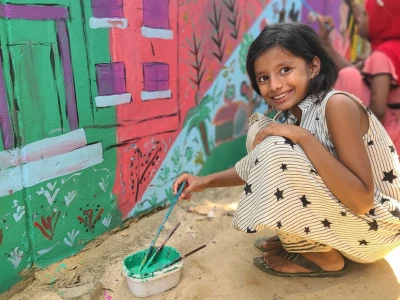12-year-old Shakib lives in a remote village in Bangladesh and attends the community school we support here. He loves to learn and especially enjoys the video lessons. He excels in maths and likes to play sports in his school’s beautiful garden.
As a member of the Child Council, Shakib shares his opinions on school activities and helps teachers implement them. He also participated in ‘Moja Kids’ as a journalist, boosting his confidence.
Shakib's father, a member of the School Management Committee, says that most elderly people in the area are illiterate: “If this school was not here, boys and girls would not have had the chance to get an education. People see my son doing so well that they are encouraged to send their children to school as well. I hope that an educated generation will be created here”.







